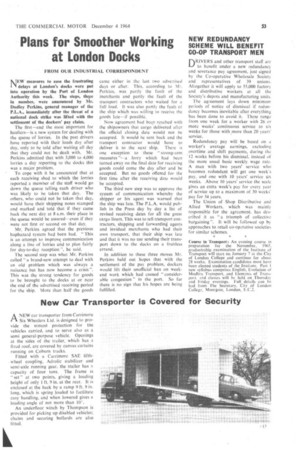Plans for Smoother Working at London Docks
Page 55

If you've noticed an error in this article please click here to report it so we can fix it.
FROM OUR INDUSTRIAL CORRESPONDENT
NEW measures to ease the frustrating delays at London's docks were put into operation by the Port of London Authority this week. The steps, thrpe in number, were announced by Mr. Dudley Perkins, general manager of the P.L.A., immediately after the threat of a national dock strike was lifted with the settlement of the dockers' pay claim.
The first—and the most important for hauliers—is a new system for dealing with the queue of lorries. In the past drivers have reported with their loads day after day, only to he told after waiting all day that they could not be dealt with. Mr. Perkins admitted that with 3,000 to 4,000 lorries a day reporting to the docks this was a major problem.
To cope with it he announced that at each receiving shed to which the lorries reported a member of the staff would go down the queue telling each driver who was likely to he taken that day. The others, who could not be taken that day, would have their shipping notes stamped and marked and told that if they came back the next day at 8 a.m their place in the queue would be assured—even if they were not first or second on that day.
Mr. Perkins agreed that the previous haphazard system had been bad. "This is an attempt to improve communication along a line of lorries and to plan fairly for day-to-day reception", he said.
The second step was what Mr. Perkins called "a brand-new attempt to deal with an old problem which was always a nuisance but has now become a crisis ". This was the strong tendency for goods to be brought to the docks at or near the end of the advertised receiving period for the ship. More than half the goods
came either in the last two advertised days or after. This, according to M Perkins, was partly • the fault of the Merchants and partly the fault of the transport contractors who waited for a full load. It was also partly the fault of the ship which was willing to receive the goods late—if possibli.
Now agreement. had been reached with the shipowners that cargo delivered after the official closing date would not be accepted. It would be sent hack and the transport 'contractor would have, to
deliver 'it to the next ship. There is one • exception to 'these "strong-arm. measures "—a . lorry which had been turned away on the final date for receiving goods could come the day after and be accepted. But no goods offered for the first time after the receiving date would be accepted.
The third new step was to approve the system of communication whereby the shipper or his agent was warned that the ship was late. The P.L.A. would publish in the Press day by day a list of revised receiving dates for all the great cargo liners. This was to tell transport contractors, shipping arid forwarding agents and invidual merchants who had their own transport, that their ship was late and that it was no u5e sending their transport down to the docks on a fruitless errand.
In addition to these three moves Mr. Perkins held out hopes that with the settlement of the pay problem, dockers would lift their unofficial ban on weekend work which had caused "considerable congestion" in the port. So far there is no sign that his hopes are being fulfilled.
































































































































































































